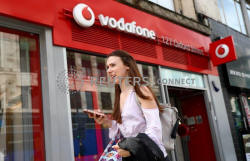Vodafone to create European mobile mast company with IPO potential
 Send a link to a friend
Send a link to a friend
 [July 26, 2019] By
Paul Sandle [July 26, 2019] By
Paul Sandle
LONDON (Reuters) - Britain's Vodafone
announced plans on Friday to separate its mobile mast operations in
Europe into a new company that it potentially could list, in a move it
said would unlock value for shareholders.
Shares in the world's second largest mobile operator jumped 8% in early
trade to 143 pence, regaining ground lost when the company cut its
dividend for the first time ever in May.
Vodafone said the tower unit, which would comprise 61,700 sites in 10
markets, could have annual proportionate revenue of 1.6 billion euros
($1.8 billion) and core earnings of 900 million euros a year.
It would overtake Cellnex, currently Europe's biggest towers group,
which is valued at just over 17 times earnings. A similar multiple for
Vodafone's towers would imply a value of more than 15 billion euros for
the assets, according to Reuters calculations.

Vodafone Chief Executive Nick Read said the tower company would be
operational by May 2020, with 75% of its sites in its biggest markets of
Germany, Italy, Spain and Britain.
Mobile operators across Europe have been selling or sharing their
network infrastructure to cut debt, tapping into the appeal of the
assets' steady cash flows to investors.
"Given the scale and quality of our infrastructure, we believe there is
a substantial opportunity to unlock value for shareholders while
capturing the significant industrial benefits of network sharing for the
digital society," Read said in a statement.
He said the proceeds from listing a minority stake in the tower company,
or from attracting other investors, would be used to cut Vodafone's
debt.
Vodafone already shares network infrastructure with Telefonica's O2 in
Britain and with Orange in Spain and is close to finalizing an agreement
in Italy with Telecom Italia's tower unit Inwit.
Cellnex reported a 10% rise in first-half core earnings on Friday, and
said it was seeking more deals.
Read said creating a standalone towers business would unlock "the
significant value of our infrastructure assets at a time when tower
multiples are very attractive".
Teaming up with other operators would also enable 5G services to be
rolled out faster and at lower cost.
[to top of second column] |

A woman holds a phone as she passes a Vodafone store in London,
Britain May 16, 2017. REUTERS/Neil Hall/File Photo

"This is a window of opportunity where 5G is launching into the market," he told
reporters.
Vodafone would look at attracting investors, including partner operators, in
local markets before rolling the assets into a European holding company, with a
view to listing a minority stake, he said.
TURNING POINT
Vodafone announced plans to split its towers business as it reported that
first-quarter group service revenue decline by a smaller-than-expected 0.2%. It
said a gradual recovery in its previously weak top line would continue.
"We are now at a turning point in our service revenue following the low point in
Q4 of last fiscal year," Read told reporters. "We are confident that this
improvement in service revenue will continue as the year progresses."
Analysts at Citi, who have a "buy" rating on Vodafone, said the better top line
and the decision to separate the towers and look at monetization should be well
viewed.
Vodafone said market conditions in Italy had continued to improve and retail
growth in Germany remained robust, which in part had been offsetting intense
competition in Spain.
The company had launched more new pricing plans and products in the quarter than
in any he could remember, including next-generation 5G services in its major
markets.
He said Vodafone was confident about its full-year guidance for adjusted core
earnings of 13.8 billion euros-14.2 billion euros ($15.4 billion-$15.8 billion)
and free cash flow before spectrum costs of at least 5.4 billion euros, Read
said.
(Editing by Guy Faulconbridge/Mark Potter/Susan Fenton)
[© 2019 Thomson Reuters. All rights
reserved.] Copyright 2019 Reuters. All rights reserved. This material may not be published,
broadcast, rewritten or redistributed.
Thompson Reuters is solely responsible for this content.
 |